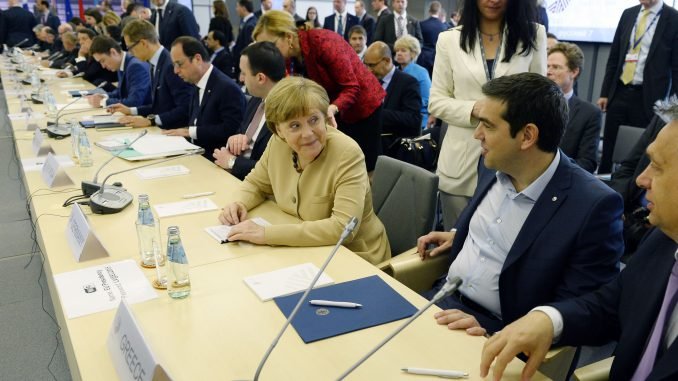
The document does not say anything about the factual annexation of Abkhazia and Tskhinvali region; the developments in Ukraine are underestimated; nothing is said about the threats that might come from Russia, and most importantly, the goals of the Eastern Partnership seem to be very vague.
Maintenance of the Eastern Partnership, as the mechanism for approximation with Europe, seems to be the greatest success of the Riga Summit. It should also be noted that Eastern Partnership is facing serious threat amid Russia’s active and aggressive policy. When we are talking about Georgia, special attention should be paid to the joint project of the Council of Europe (CoE), European Investment Bank (EIB) and European Bank for Reconstruction and Development (EBRD) that aims at unprecedented support to small business development in Georgia, Ukraine and Moldova. The entry about Visa Liberalization is also important. Despite the fact that it just describes the procedure and does not demonstrate any political support, the entry still represents a positive element since it intensifies the expectations of the European Union and strengthens pressure on Georgian Government demanding timely implementation of the set requirements. Recognition of the progress achieved by Georgia on its way to democratic development and reforms and appreciation of participation of Georgian soldiers in international missions are also very significant.
However, excessive caution can be felt in every sentence of the Declaration. Despite the fact that during the last two years Russia demonstrated incredible aggression towards its neighbors by annexation of Crimea, factual annexation of Abkhazia and Tskhinvali regions, recurrent violation of international law and posing a threat to the architecture of European security, it has been mentioned only once in the Declaration in relation to the negotiations with Ukraine on natural gas. It is absolutely obvious that Brussels once again tried not to irritate Russia or aggravate the relationships with it. Hence, Brussels decided on the policy of concession that was clearly demonstrated in the Declaration by minimal description of Moscow’s the so called “legitimate interest” (the Summit has not reaffirmed the European perspective of the countries that have consistently shown the best performance).
In order to avoid complete capitulation, Brussels stated in the very first section of the Declaration that the Eastern Partnership still represents the framework dimension defining the EU neighborhood policy. However, it could not dare leave Armenia and Belorussia beyond the program that would have been assessed as a step made against the Eurasian Union. By doing so, the EU allowed Russia to retain its leverages within the Eastern European Partnership. Brussels also reaffirmed the free choice and aspiration of the Eastern European Partnership countries towards European integration; however, it did not confirm its readiness for the process indicating Russia that it was not acting against Russia’s interests. At the same time, Brussels comforted the Eastern European Partnership countries by stating that their ambitions and level of integration with the EU would depend on the progress achieved by those countries on the way to democratization and reforms. However, it was not even mentioned that it is Russia that opposes democratic development of the Eastern European Partnership countries practicing blackmail, military intervention, propaganda policy and economic pressure.
It would be a mistake if we only attribute Brussels retreat to Russia’s political, military or financial proactive performance or blackmail to start a new war in Ukraine, inflexibility of Europe or controversial positions of the member states. We have to admit that there was no appropriate coordination among the Eastern European Partnership countries until the very last moment. The ground for Brussels to make the above decision was insufficient activity and unpreparedness of three countries of the Eastern European Partnership. In case of Georgia, the Council of Europe published its conclusion on the implementation of visa liberalization action plan three days before the Summit. Tbilisi had only implemented 7 requirements out of 15 and provided a sound reason to the skeptics to make their bold announcement about Georgia not being ready for visa-free regime. Selective justice, imprisonment of high officials and their persecution in foreign countries casted doubts on and seriously damaged the reputation of Georgian democracy and the newly reformed Public Prosecution Office and Court system, which, along with economic hardship, enabled the skeptics to declare that Georgia is very far away from European perspective. If we look at the situation objectively, we would only lie to ourselves by saying that under the existing conditions Georgia received maximum from the Riga Summit; however, insisting on having left the Summit empty-handed would not be correct either. The country actually received pro-rata maximum of the level of activity, aspiration, professionalism and political priorities of its Government and, respectively, minimum of what could have been achieved through efficient work had we taken the advantage of the existing political situation in the region during the last two years.
The EU and the Eastern Partnership countries ended up in a defensive position after the Riga Summit; however, “the war” has not ended yet. Georgia and its allies should learn the lesson and make respective conclusions. The Government of Georgia should give up dividing its “home assignment” into winning and losing positions and do it fully. On the other hand, it should perceive that along with working hard in order to achieve the goal, it is important to fight together with the allies. This should be the fight not only for our own and common interests, but against the common enemy as well.
The piece originally appeared on georgianreview.ge

Be the first to comment